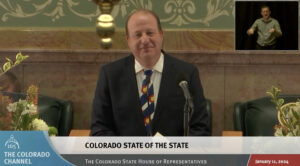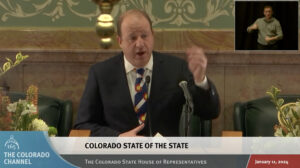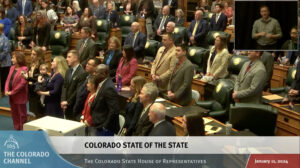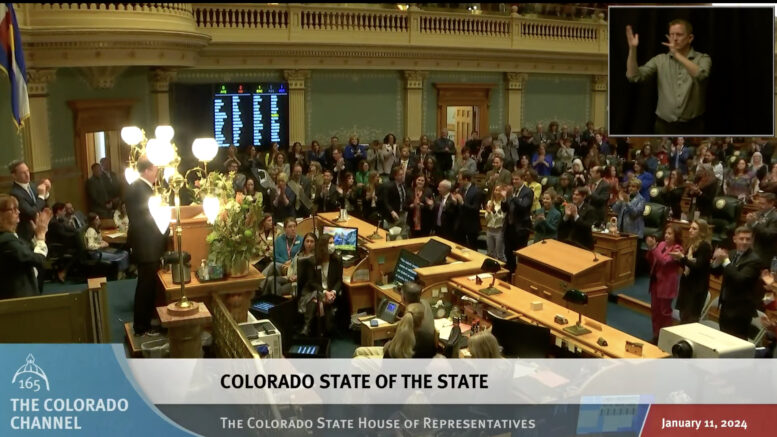Gov. Jared Polis spanned the political spectrum in his State of the State Address Thursday, calling for big transit spending and more environmental-justice regulations but also telling legislators he wants income-tax cuts and housing changes that include construction-defects reform.
The annual speech included a wide-ranging and lengthy set of policy goals, from creating more transit-oriented communities as an affordable-housing solution to investing more in the creation of new career pathways to finding more ways to limit prescription-drug prices. The sixth-year Democratic governor weaved a theme throughout it that now is the time to take bold steps as the state approaches its sesquicentennial in 2026, in order to allow it to be a leader in areas from its growing quantum sector to providing more housing for residents.
Polis, clearly feeling emboldened after cruising to re-election in November 2022 and having his name circulated in recent months as a potential future presidential candidate, challenged both parties to bend their traditional thinking to make the state more livable and affordable. At one point in the 57-minute address, he called on Democrats to drop their opposition to cutting the income tax and then said cuts should be part of the progressive reforms to Taxpayer’s Bill of Rights refund mechanisms that Republicans have opposed as wealth redistribution, drawing bipartisan silence.
“Isn’t that great? We got applause from nobody, so everybody agrees,” Polis said as he veered off-script in acknowledgement of the crowd’s reaction. “Compromise!”

Gov. Jared Polis smiles during his 2024 State of the State Address on Thursday.
Housing priorities in State of the State
All joking aside, the address laid out a litany of legislative proposals that could take up a whole session’s worth of work on their own. They had just enough government-led and free-market solutions for both parties to like and dislike that Polis almost seemed to be laying out a path in which Republicans and Democrats must give a little to achieve their biggest priorities.
On what is expected to be this session’s biggest issue — the effort to spur construction of more affordable housing — Polis asked legislators to support a quartet of bills that are successors to his omnibus land-use-reform bill that died last year. They involve funding local housing-needs assessments, granting the rights to all property owners to build accessory dwelling units and barring occupancy limits for unrelated individuals.
But it was the fourth tenet that was the focus of much of Polis’ attention, as he called for the creation of denser communities near transit lines that are bikeable and walkable and offer both affordability and reduced vehicle-based emissions. In conjunction, Polis asked legislators to take advantage of federal grants to begin building the Front Range passenger rail line he’s long championed, to create a statewide bus system and to reconfigure the Denver-area Regional Transportation District so it can work more efficiently and extend light rail into the Boulder area.
“If we move boldly this session to seize these unprecedented federal investments, we can lock in transformational passenger rail opportunities in time for our 150th birthday in 2026,” he said. “The story of our state’s founding and economic success is intertwined with the historic railroad expansion of the 1800s, just as our dreams for the future will be intertwined with the expansion of passenger rail and transit-oriented communities.”

Gov. Jared Polis exhorts legislators to action during his 2024 State of the State Address on Thursday.
A nod to construction-defects reform
Polis said he’d support housing bills with other ideas, including new financing strategies and easing of construction-related parking requirements, but it was one listed trait that seemed to send a message to his own party, which holds large majorities in both legislative chambers. The governor said he’s support “tackling liability costs for multifamily condos” — an apparent reference to the construction-defects reform bill that a pair of moderate Democrats will introduce but that is already drawing criticism from the party’s more progressive wing.
It wasn’t the only time that Polis promoted ideas that are likely to draw praise and ire simultaneously from the two parties.
On environmental issues, the clean-energy-supporting governor said he wants to improve air quality further by utilizing recommendations from environmental-justice advocates. Though Polis didn’t note specific restrictions he would back, that community has called for a decrease in oil-and-gas wells and much stricter limits on emissions in lower-income areas.
But the governor also said legislators need to “cut red tape that’s holding back local investment and unprecedented federal resources in renewable and clean energy, including building transmission lines more quickly.” And he said the state must develop guidelines for “storing carbon dioxide pollution underground” — a carbon-sequestration process that environmental organizations and some legislators have been reticent to streamline because underground storage also leads to production of (less carbon-intensive) oil and gas, even as it takes pollution from the air.
Tax talk in State of the State
On fiscal policy, Polis declared bluntly that “the tax rate is simply too high,” citing multibillion-dollar surpluses of revenue above the TABOR cap in recent years, and he called for a reduction in the state’s income-tax rate without citing a specific level to which he wants to see it fall. He also urged legislators to “do as much as you can to reduce property taxes,” asking them to work toward a long-term replacement of the recently repealed Gallagher Amendment to keep property taxes low.
“Tax relief is the best mechanism to relieve costs-of-living pressure and spur economic growth for everyone in our state,” the governor said.

Legislators stand in the Colorado House chambers near the beginning of Gov. Jared Polis’ 2024 State of the State Address.
However, he also chastised Republicans for their unwillingness during the 2023 regular and special session to put TABOR surplus money toward property tax relief. While Republicans have said such a plan could lead to the eventual elimination of TABOR refunds, Polis said it would allow for property-tax cuts without harming services like fire protection and schools that benefit from the revenue.
The governor also emphasized the need to continue investing in workforce development at a time when businesses are rife with open jobs and employers complain of struggles to find the talent to match their vacancies with needed skills. He lauded a coming bipartisan bill that will seek to expand the Opportunity Now grant program that funds public-private partnerships in workforce training and that also seeks to fund plans to identify regional talent shortfalls and create pipelines to fill them.
Workforce development and health care
“Colorado is becoming the national leader in this work,” Polis said. “And by innovating, innovating, innovating, we will continue to save Coloradans money while strengthening our workforce for a more prosperous future.”
Applause flowed more freely from Democratic legislators as Polis declared that Coloradans “are tired of being ripped off on the prices of necessary medications” and vowed to focus on that area of health-care reform. He said he’ll continue to urge the U.S. Food and Drug Administration to approve the state’s application to import lower-priced Canadian drugs and will push for more action from the state’s Prescription Drug Affordability Review Board, but he didn’t site a specific bill for legislators to pass.
One area that Polis did not broach in the address was regulatory relief, despite a Colorado Chamber of Commerce survey, referenced by Senate Minority Leader Paul Lundeen in his opening-day speech Wednesday, showing that increasing regulations are by far the biggest obstacle to businesses considering expansion in the state. Tony Gagliardi, state director of the National Federation of Independent Business, said that omission, as well as the governor’s focus on mass transit, offset some of the more business-friendly policies that Polis suggested.
“While briefly mentioning the needs of employers for employees with trained skills, the governor failed to mention any regulatory relief allowing for business owners to free up capital to hire additional workers,” Gagliardi said in a news release.
